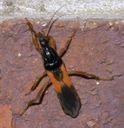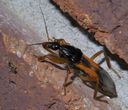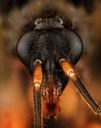Sirthenea carinata
Classification
- Phylum: Arthropoda
- Subphylum: Hexapoda
- Class: Insecta
- Order: Hemiptera
- Suborder: Heteroptera
- Infraorder: Cimicomorpha
- Family: Reduviidae
- Subfamily: Peiratinae
- Genus: Sirthenea
- Species: carinata
Pronunciation
How to pronounce Sirthenea carinata: /sɪrˈθiːniə kəˈraɪnɑːtə/
These audio files are automatically generated. While they are not always 100% accurate, they are a good starting point.
Images





Summary
Sirthenea carinata, a species of corsair bug from the family Reduviidae, is notable for its size and striking coloration. It exhibits a change in prey selection as it matures from juvenile to adult stages.
Physical Characteristics
Very large, elongate, yet robust bug with bold black and orange pattern.
Identification Tips
Look for a large insect with an elongated body and a distinct black and orange coloration.
Habitat
Found in various habitats across Central and South America, particularly in areas where prey is abundant.
Distribution
Ranges from the United States (New Jersey to Florida, Illinois, Texas) to Brazil.
Diet
As an ambush predator, it primarily feeds on other insects, with juvenile stages being generalists and adults becoming specialists.
Life Cycle
Life cycle includes egg, nymph, and adult stages, with significant changes in prey selection from juvenile to adult stages.
Reproduction
Details on the specific reproductive habits are not provided, but typical for Hemiptera, involves egg-laying.
Ecosystem Role
Acts as a predator in its ecosystem, helping to control pest populations.